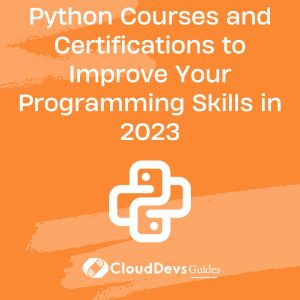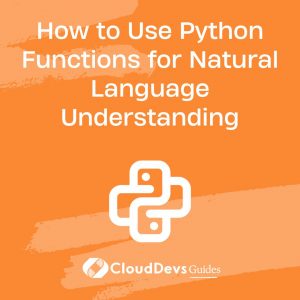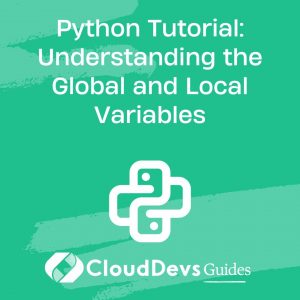Python Courses and Certifications to Improve Your Programming Skills in 2023
Python has solidified its status as a prominent programming language, especially in the realm of software development, garnering broad acceptance across enterprises of varying sizes. With its robust capabilities, Python caters to diverse development needs, leading to a growing demand for skilled Python developers.
Table of Contents
For those seeking to elevate their Python proficiency or venture into the field of Python development, considering certification programs or enrolling in relevant courses can offer significant benefits. This article will delve into some of the top Python certification options and courses available in 2023.
1. Python for Everybody on Coursera
Python for Everybody is a course offered by the University of Michigan that covers the basics of Python programming. The course is available on Coursera and takes around 3-6 months to complete. It is suitable for beginners and requires no prior programming experience.
The course modules are;
- Programming for Everybody (Getting Started with Python): In this course, you will embark on a journey to learn the basics of programming using Python, laying a strong foundation for your coding endeavors.
- Python Data Structures: Explore the intricacies of Python data structures, including lists, tuples, and dictionaries, gaining essential skills for effective data manipulation and organization.
- Using Python to Access Web Data: This section will teach you how to harness the power of Python to access and retrieve data from the web, providing valuable insights into web scraping and data extraction.
- Using Databases with Python: Delve into the integration of Python with databases, learning how to interact with databases, perform queries, and manage data effectively for robust applications.
- Capstone: Retrieving, Processing, and Visualizing Data with Python: In this capstone project, you will apply your Python skills to retrieve, process, and visualize data, showcasing your proficiency in real-world data-driven tasks.
After completing this course successfully, you will be able to receive a certificate of completion from the University of Michigan.
2. Crash Course on Python on Coursera
Crash Course on Python is a comprehensive Python course on Coursera by Google. This course is offered by Google and is designed for beginners. It covers the basics of Python programming, including data structures, functions, and loops. The course takes around 1-3 months to complete.
The six-course modules are;
- Hello Python!: In this section, you will be introduced to the fundamentals of Python programming, setting the stage for your journey into the language.
- Basic Python Syntax: This section will explore the basic syntax of Python, learning about variables, data types, and essential programming constructs.
- Loops: You will dive into the world of loops in Python, understanding how to create efficient and dynamic iterations to streamline your code.
- Strings, Lists, and Dictionaries: Here, you will learn about essential data structures in Python, including strings, lists, and dictionaries, and understand how to work with them effectively.
- Object-Oriented Programming: In this topic, you will delve into the principles of Object-Oriented Programming (OOP) in Python, learning how to create and use classes and objects for modular and reusable code.
- Final Project: Conclude your Python learning journey with a final project, applying the knowledge and skills you’ve acquired to create a practical and meaningful application.
Upon successful completion of this course, you will be able to receive a Google-certified career certificate which you can share on LinkedIn and other social media platforms.
3. Learn Python – Full Course for Beginners by freecodecamp.org
Learn Python – Full Course for Beginners is a complete Python course offered by freeCodeCamp.org and is designed for beginners. It covers the basics of Python programming, including data structures, functions, loops, and more. This Python course is available on YouTube and takes around 4-5 hours to complete.
This free YouTube course covers;
- Introduction: In this section, you will be introduced to the fundamentals of Python programming, setting the stage for your learning journey.
- Installing Python and PyCharm: You will learn the process of installing Python and PyCharm, essential tools for Python development, ensuring a smooth setup.
- Setup and Hello World: This module will guide you through the initial setup and execution of your first Python program to print “Hello World.”
- Drawing a Shape: This module will explore drawing shapes using Python, gaining hands-on experience in basic graphical representations.
- Variables and Data Types: You will learn about variables and various data types in Python, understanding how to store and manipulate information.
- Working With Strings: This section will delve into the manipulation of strings in Python, discovering methods to efficiently handle textual data.
- Working With Numbers: This topic will teach you to understand the manipulation of numerical data in Python, exploring arithmetic operations and mathematical functions.
- Getting Input From Users: This topic will teach you how to obtain user input in Python, making your programs interactive.
- Building a Basic Calculator: Here you will learn to create a basic calculator program in Python, applying your knowledge of variables and operations.
- Mad Libs Game: You will explore the creation of a Mad Libs game, integrating user input into a playful and dynamic Python program.
- Lists: You will understand the concept of lists in Python, a versatile data structure for storing collections of items.
- List Functions: Here you will learn about functions associated with lists in Python, enhancing your ability to manipulate and manage list data.
- Tuples: This module will explore the use of tuples in Python, understanding their characteristics and applications in programming.
- Functions: This module will guide you through the creation and utilization of functions, a fundamental building block in Python programming.
- Return Statement: You will learn about the return statement in Python functions, understanding how to provide results from function execution.
- If Statements: Here, you will understand the use of if statements in Python, enabling conditional execution based on specified conditions.
- If Statements and Comparisons: You will explore the nuances of if statements and comparisons in Python, enhancing your control flow capabilities.
- Building a Better Calculator: You will apply your Python knowledge to build an improved calculator program with additional functionalities.
- Dictionaries: You will learn about dictionaries in Python, a powerful data structure for organizing and accessing data through key-value pairs.
- While Loop: You will explore the implementation of while loops in Python, creating iterative and dynamic programs.
- Building a Guessing Game: This section will teach you to apply your understanding of loops and conditional statements to create an engaging guessing game in Python.
- For Loops: You will learn about loops in Python, a versatile construct for iterating over sequences and collections.
- Exponent Function: You will understand the implementation of an exponent function in Python, exploring mathematical computations.
- 2D Lists and Nested Loops: You will explore the concept of 2D lists and nested loops in Python, managing multidimensional data structures.
- Building a Translator: Here, you will apply your Python skills to build a simple translator program, showcasing string manipulation and conditional statements.
- Comments: You will learn the importance of comments in Python, enhancing code readability and documentation practices.
- Try / Except: You will understand error handling with try and except blocks in Python, ensuring robust and resilient programs.
- Reading Files: This section will explore file input operations in Python, learning how to read and process data from external files.
- Writing to Files: You will learn how to write data to files in Python, enabling the persistence of program-generated information.
- Modules and Pip: You will understand the usage of modules and the Pip package manager in Python, expanding your program’s capabilities.
- Classes and Objects: This section will delve into object-oriented programming in Python, understanding the concepts of classes and objects.
- Building a Multiple Choice Quiz: You will apply your knowledge of classes and user input to create an interactive multiple-choice quiz in Python.
- Object Functions: This will explore functions associated with objects in Python, enhancing the capabilities of your class-based programs.
- Inheritance: This section will teach you about inheritance in Python, a key OOP concept that promotes code reuse and hierarchy.
- Python Interpreter: Here, you will understand the Python interpreter, exploring its role in executing Python code and facilitating interactive sessions.
By the end of this course, you will have an extensive knowledge of Python programming, and move on to some more advanced programming practices.
4. Python Basics on Coursera
Python Basics is a complete Python course offered by the University of Michigan on Coursera and this course is designed for absolute beginners. It covers the basics of Python programming, including conditional statements, loops, and data structures like strings and lists. The course is part of the Python 3 Programming Specialization and takes around 34 hours to complete.
The course modules are;
- General Introduction: In this Python module, you will receive a general introduction, providing an overview of Python programming and setting the stage for your learning journey.
- Sequences and Iteration: This section will explore the fundamentals of sequences and iteration in Python, learning how to work with data structures and create efficient loops for repetitive tasks.
- Booleans and Conditionals: This section will delve into the concepts of Booleans and conditionals in Python, understanding how to implement logical expressions and make decisions in your code.
- Sequence Mutation and Accumulation Patterns: In this section, you will learn about sequence mutation and accumulation patterns in Python, allowing you to modify data structures and accumulate results for complex operations.
You will receive a certificate from the University of Michigan through Coursera.
Here, in this article, we have added a comparison table for the above-mentioned Python courses and certifications.
| Course/ program | Cost | Level | Duration | Study mode |
|---|---|---|---|---|
| Python for Everybody | Free | Intermediate | 2 months (10 hours per week) | Online |
| Crash Course on Python | Free | Beginner | 22 hours | Online |
| Learn Python - Full Course for Beginners | Free | Beginner | 4 hours 26 minutes | Online |
| Python Basics | Free | Basics / Intermediate | 34 hours | Online |
The provided comparison table highlights variations among different Python courses, encompassing factors such as duration, costs, and prerequisites. Course fees are influenced by factors like the learning platform, study format, and course duration. When selecting a Python certification course, it is essential to assess its compatibility with your skill set, financial constraints, and career objectives.
5. Conclusion
In conclusion, enrolling in a Python course in 2023 offers a significant opportunity for career growth. Through effective training, you can sharpen your skills as a Python developer and engage in diverse and impactful projects. Whether you are a new python developers or an experienced Python developer, there is a range of courses and certification programs available to elevate your expertise in Python programming.
Table of Contents







